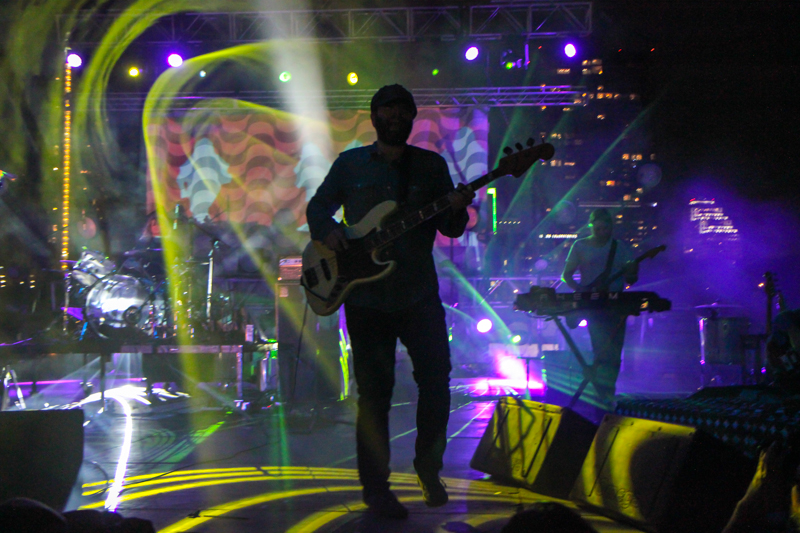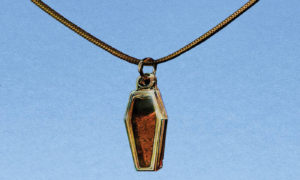 Austin Psych Fest commences at the end of this week–in only two days if you count the pre-party festivities that will unfold on Thursday night. The festival has grown epically since it’s inception, garnering buzz worldwide. This is far from a local operation at this point, and bands will be traversing the globe to perform at the festival. Sydney, Australia’s The Laurels are one such band. They just might be the band travelling the furthest for the festival. They’ll also be playing a few more dates while they’re stateside in support of their new album Plains. You can see the band at 3:00 PM on Sunday on the Reverberation Stage. We were able to correspond with bassist Conor Hannan about psych music and some of the band’s earliest influences. Push play on the stream below and check out our interview that follows.
Austin Psych Fest commences at the end of this week–in only two days if you count the pre-party festivities that will unfold on Thursday night. The festival has grown epically since it’s inception, garnering buzz worldwide. This is far from a local operation at this point, and bands will be traversing the globe to perform at the festival. Sydney, Australia’s The Laurels are one such band. They just might be the band travelling the furthest for the festival. They’ll also be playing a few more dates while they’re stateside in support of their new album Plains. You can see the band at 3:00 PM on Sunday on the Reverberation Stage. We were able to correspond with bassist Conor Hannan about psych music and some of the band’s earliest influences. Push play on the stream below and check out our interview that follows.
Pop Press International: What does the “psychedelic” descriptor mean to you?
Conor Hannan: That’s such a hard one. Everything’s psychedelic these days. I guess in the 1960s it suggested a sort of lysergic experimentalism – best characterized, in my mind, by bands like the Silver Apples, Red Krayola, and the 13th Floor Elevators. Successive generations of musicians have discovered the underground music of this era on a broader level – largely through the wealth of excellent compilations – and re-appropriated it in profoundly different ways. It can be such a problematic term, though. Comparing Spacemen 3 with the Grateful Dead seems a stretch. I think it has a lot to do with an emphasis on texture and melody and, to a lesser extent, repetition and drone.
PPI: Is a “psychedelic” sound something that you consciously think about when creating music or is that sound just a natural occurrence?
CH: Nah, not at all. Sometimes I think we do the opposite. It feels natural to slip into a two-chord freakout at rehearsal. We generally try to complicate it a bit when we’re getting new songs down. No use rehashing what our influences can do better than us!
PPI: Does it feel different to be playing a thematic or genre-oriented festival rather than a general music festival?
CH: Yeah! I think for the reasons previously stated, there’s actually a huge diversity of styles being presented at Austin Psych Fest. And yet, I’m looking forward to just about everything. It’s basically a festival of good shit.
PPI: What bands are you most excited to see on the bill—to play alongside?
CH: Seriously, like all of them, I’m pretty pumped for Moving Sidewalks, obviously (I’m gonna lose my shit for ‘99th Floor’). Os Mutantes, Roky Erikson, and Spectrum have all been pretty huge influences for us, too. I think I’m mostly looking forward to the bands I haven’t heard before, though. I’ve had about a million people tell me to watch Dead Skeletons, for instance.
PPI: What were some of the first bands you remember hearing that could be called psychedelic?
CH: Album-wise, probably Cream’s Disraeli Gears or The Animals’ Winds of Change. They were two of my dad’s favorites, and really got me interested in music as a child. A little later I was drawn to the LP cover of Country Joe and the Fish’s Electric Music for the Mind and Body, which was also in his collection As a 14 year old listening to terrible teenage music, the bratty vocals and howling guitars proved to be a real game-changer. I remember being particularly blown away by ‘Porpoise Mouth.’ I’d never heard anything like that before. I still remember rushing home from school so I could crank it on the stereo before anyone else got home.
PPI: Can psychedelic music help us to transcend our natural ways of seeing/thinking and reach higher levels of consciousness?
CH: Probably. I guess there’s something to be said about drone and repetition, and its use in the classical music of non-western cultures. Alice Coltrane or Pharoah Sanders have provided me with the closest thing to a transcendental musical experience in that sense, I think. I kind of feel like all good music should really do that anyway, though. Popping on a Rolling Stones record at the right time and place does wonders for the spirit.










